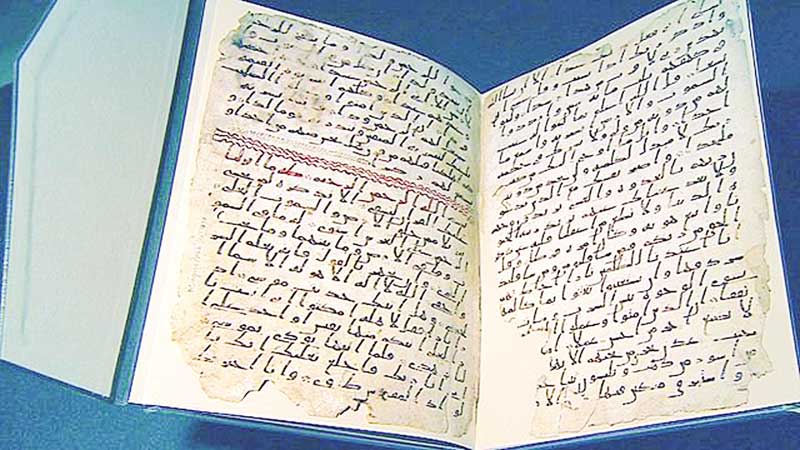
There is nothing in the Qur’anic textual tradition which demonstrates such a level of corruption. Two such infamous cases are the inclusion of several key doctrinal verses in Mark 16:9-20 and 1 John 5:7. This is at odds with the New Testament textual tradition which shows changes manifesting themselves as inclusive of the official Church accepted scriptural tradition. In the case of scribal errors, these did not manifest themselves into the Qur’anic tradition and as such remained as the odd anomaly here and there which scribes later corrected, but which never found themselves to be seen as part of the Qur’an’s canon. Orthography as defined, is the representation of a language in a textual graphical form.Īs the language developed textually, the manuscript records demonstrate that the Qur’an remained consistent in its contents whereas changes being made were those of the representation of its letters, vowels and punctuation marks. Orthographic changes and scribal mistakes. However these changes in the manuscripts are generally of two types. In applying the methodology of New Testament Textual Criticism to the Qur’an, we have come to know that the Qur’an has indeed been well preserved.

They do not allow and they wholly reject any random and unknown individuals to produce critical editions of the New Testament, thus following in the methodology and footsteps of ‘Uthman (رضي الله عنه) himself.

Such a criticism is unfounded given that they have later imitated such a methodology of controlling their scripture’s transmission in the form of the Pope sanctioning the Vulgate, the use and dissemination of the Textus Receptus and of today’s Greek Critical Texts which are controlled by their foremost scholars in the field of Textual Criticism. One such major condemnation is the control of manuscript copying by the Caliph ‘Uthman (رضي الله عنه), they have posited that his act of standardizing the copying of the Qur’an negatively impacted the Qur’an’s preservation.

Christian criticism of the Qur’anic manuscripts has been appalling to say the very least. Due to this, we can list the identities of a significant number of Qur’anic scribes during the Prophet’s ﷺ lifetime. Most importantly, the identity of our copyists and scribes of the Qur’an have been known to us for centuries as we have employed the sciences of Rijal al Hadith, Mustalah al Hadith (the sciences of evaluating the characters of scribes and transmitters) and Jarh wa Ta’deel. One such field within ‘Uloom al Qur’an is ‘Ilm al Rasm al Mushaf, or the Science of the Writing of the Copies of the Qur’an. For centuries before the development of New Testament Textual Criticism as it is known today, Muslims have been utilising the science of ‘Uloom al Qur’an (the sciences of the Qur’an). Unbeknownst to them, Muslims have been practising stringent critical studies of the Qur’an’s manuscript tradition since its revelation. We have been accused of not critically studying the Qur’an using the methodology of Textual Criticism, the reason being that we Muslims implicitly know that God has not protected the Qur’an thus proving it is a falsehood.Ĭhristian apologists have challenged the Muslim world to apply their methodology of Textual Criticism to the Qur’an, so that we may establish that the dismal state of the New Testament manuscript record is on par with the Qur’an’s. Muslims for centuries, since the Qur’an’s revelation have held strongly to the belief that it is God who would guard the transmission and preservation of the Qur’an as is mentioned explicitly in Surah 15, Verse 9. As a consequence of this, Muslim preachers have taken the initiative in using this important information to confirm the Qur’anic claim of corruption regarding the scriptures of the Jews and Christians in Surah 2, Verse 79.Ĭhristian apologists in response to this weakening of their scripture, are now attempting to weaken the stature of the Qur’an’s preservation. The poor state of the New Testament manuscript record has, in our time led the Judaeo-Christian world to have great doubt in the veracity and authenticity of the New Testament as a scripture.

The complete document is linked at the bottom of this page. The following is a background and summary of the issues discussed. Ijaz Ahmad from Trinidad & Tobago produced a document with a detailed response to him highlighting his mistakes and lies. Shabir Ally on the topic “Which is the Word of God: The Bible or the Qur’an?” In this debate he made bold claims about the Qur’an.īr. 🔊 Listen to this Muslim Studies on Qur’anic Manuscripts


 0 kommentar(er)
0 kommentar(er)
